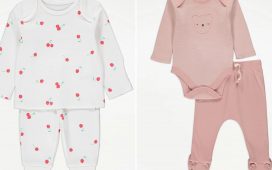MUMS-TO-BE are up in arms about plans to have every drop of booze they drink during pregnancy recorded on their baby’s medical file.
The controversial policy would even cover drinks consumed BEFORE the woman knew she was pregnant – and Brits are completely divided over the issue.
The National Institute for Health and Care Excellence (NICE), which is recommending the move, says accurate records of a mum’s alcohol intake are required for identifying kids at risk of foetal alcohol spectrum disorder.
Some see the booze record as an unfair infringement on privacy – but others see it as a necessary medical effort to reduce harm to babies.
Earlier this year, mum-of-five Zola admitted she drank throughout all her pregnancies, insisting her kids were healthy and happy.
Here, two mums make the case for and against the new rules.
‘Women have become used to having their bodies and behaviour judged’
Caroline Iggulden, Associate Editor of The Sun
WHEN a mother gives birth, it is not only an adorable cooing baby she welcomes into the world, but a big, bouncing bundle of guilt, the like of which she has never known before.
And just like infants, ‘mum guilt’ grows all the time.
Am I working too much? Am I working too little? Am I ruining my baby’s teeth by giving him a dummy? Is it OK my children have munched through a multipack of Kit Kats in a week?
And so on and so on.
Now, courtesy of a brilliant new brainwave by the ironically titled health body NICE, women can start beating themselves up even before that faint blue line even appears on the window of the pregnancy test.
I have yet to meet a woman who didn’t fully understand the weight of that awesome responsibility and act accordingly
This crazy new ruling would mean even a small glass of wine a woman may have knocked back even before she knew she was knocked-up would be noted down in her child’s medical records.
Being 22 weeks pregnant with my third child, when I read this new ruling it caused me to choke on my decaffeinated tea.
Pregnancy is a time when stress levels are already through the roof – this extra level of scrutiny seems needless.
Must our children’s medical notes become ledgers of shame, with even the tiniest of tipples noted down as evidence of their mother’s delinquency?
And the only reason I can think of for this all to be recorded is so a finger can be pointed firmly at mums should their child encounter any future issues.
I just turned 40 and as a ‘geriatric’ mother – which I have been flatteringly labelled by the health profession – I already have ample levels of mounting anxiety without being guilt-tripped about the levels of rosé I was consuming in lockdown before I even realised I was pregnant.
Pregnancy is without doubt a serious business. Nurturing a human life inside of you is not to be entered into lightly.
But I have yet to meet a woman who didn’t fully understand the weight of that awesome responsibility and act accordingly.
I have known highly educated, ball-breaking career women to bolt from dinner tables in tears because they have accidentally nibbled a mouthful of soft-cheese.
Already the list of pregnancy no-no’s is endless, from pâté to salami, rare steak to excessive tuna consumption.
Some expectant mothers with high risk pregnancies are even told sex is often the menu.
Last month yet another study put the fear of God into us all saying no level of caffeine was safe in pregnancy.
And I have even read, horror of horrors, you should avoid Mr Whippy ice cream if you are with child.
What’s next? Will a surreptitious Flake 99 on a hot day prompt an anonymous call to the health authorities?
Much of this advice of course varies hugely country to country. In America, where I had my first two sons, sushi was off-limits yet in Japan they shovel it down with gusto believing raw fish is beneficial in pregnancy.
French women keep on munching Brie like there is no tomorrow.
As someone who has experienced the trauma of multiple miscarriages and ectopic pregnancy, I don’t take pregnancy lightly.
I have known highly educated, ball-breaking career women bolt from dinner tables in tears because they have accidentally nibbled a mouthful of soft-cheese
But I also know from expert medical investigation and opinion that these sorrows were not brought about because I enjoyed the odd cup of tea with a slice of toast in the morning.
Make no mistake, foetal alcohol syndrome is an incredibly serious condition.
Whilst there is no established safe level of alcohol consumption for women in pregnancy there is also zero evidence that low levels of alcohol intake cause any harm.
I would be fibbing if I said I hadn’t snuck a very occasional glass of wine – I have two kids and it has been a long summer holiday.
And maybe a glass of bubbles to toast my 40th (did I mention I am a geriatric mother?).
Of course NICE has also seemed to overlook the fact that since time began alcohol consumption and conception have often gone hand in hand.
I often wonder if blokes would put up with such policing.
Aside from the fact vast funds would have been channelled into finding alternative methods to giving birth should men have been the child bearers, I also think throughout history women have become used to having their bodies and behaviour judged and regulated.
Instead of finger wagging, perhaps NICE should focus on ensuring all women and babies get the top quality maternity they deserve.
I’ll raise a non-alcoholic beverage to that.
‘If you’re having a drink, your baby is too’
Tanith Carey, parenting expert
Imagine this.
You’re holding your new-born baby tenderly in your arms. He’s hungry and time for a feed.
Only instead of giving him milk, you decided to fill his bottle with some wine.
No mother would do this – so why is it still considered OK for a woman to do this when that baby is still inside her body?
At the moment, the current thinking is that until birth, a woman’s body is hers to do whatever she likes with.
But if you’re having a drink, your baby is too.
Alcohol passes via the placenta into your baby’s bloodstream.
An unborn child’s liver is one of the last organs to finish growing in the womb, so it’s unable to filter it in the same way.
This is why the NICE has suggested noting the amount of alcohol pregnant women drink on their medical records.
This is to help spot kids at risk of developing foetal alcohol syndrome and foetal alcohol spectrum disorder, a group of lifelong conditions which can affect learning and behaviour.
It won’t be a moment too soon.
No other generation of women has ever drunk as heavily or as regularly as we do now.
Yet despite pregnancy only being nine months, we have stopped short of telling mums it’s deeply irresponsible.
This is despite the most recent research which found there is no safe amount of alcohol for a woman to drink – at any stage of her pregnancy.
The result is that by not wanting to upset mums or invade their privacy, pregnancy drinking has become the ‘elephant in the room’ when we’re talking about the number of children who have learning difficulties in the UK.
The toll is now becoming clear.
If keeping a record of what mothers-to-be drink prevents any more damage to babies before their lives have even begun, it’s a price worth paying
One in six children in the UK could have FASD symptoms, according to the most recent estimate by the Universities of Bristol and Cardiff.
Rather than listen to the ‘it’s-a-free-country’ brigade on this matter, I’d rather hear from the people who are actually dealing with the fallout of maternal drinking.
They are people like Professor Barry Carpenter, an expert in the education of children with complex needs who calls FASD the “the most common cause of preventable learning disability in the UK”.
“It’s something I think, as a society, we still do not want to face up to,” he insists.
No, we haven’t wanted to face up to it.
The result is that we have the fourth highest level of prenatal women drinking in the world and many more children with special needs than there needs to be.
If keeping a record of what mothers-to-be drink prevents any more damage to babies before their lives have even begun, it’s a price worth paying.

























